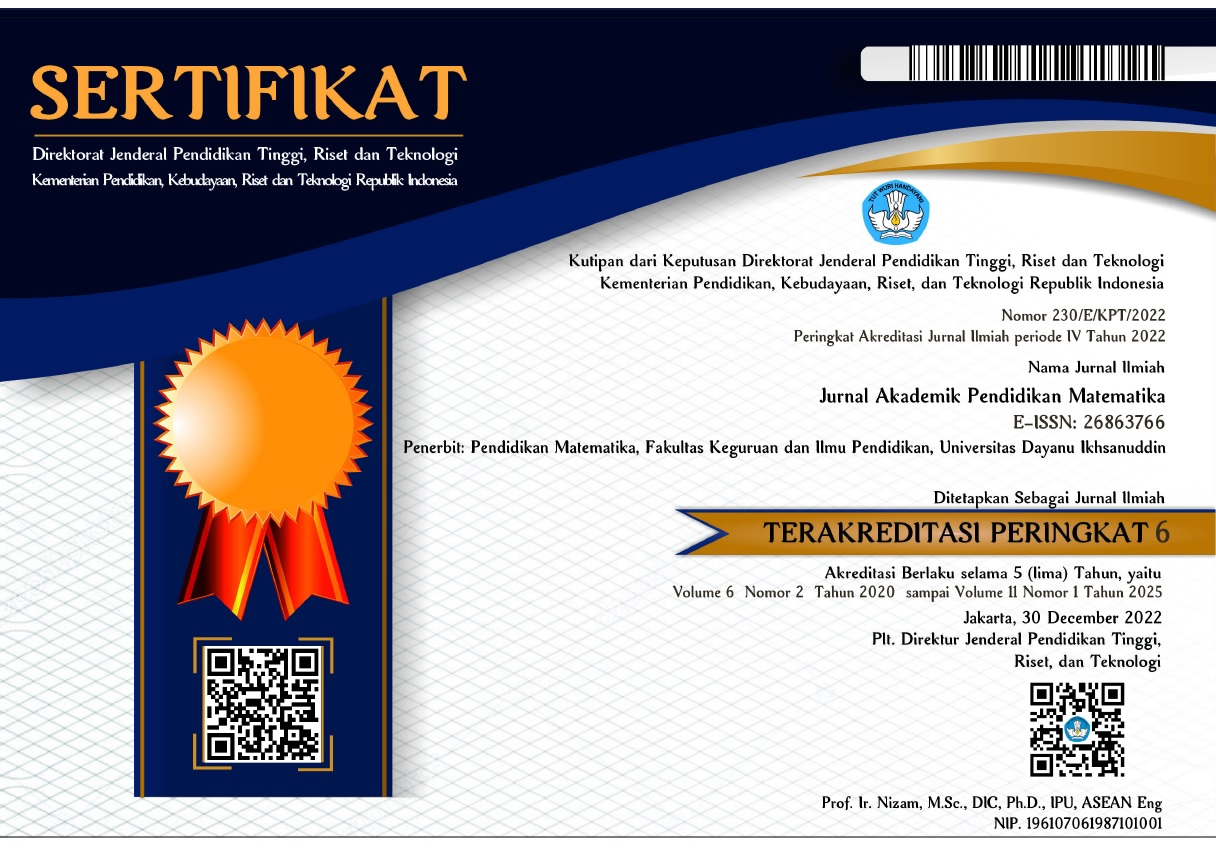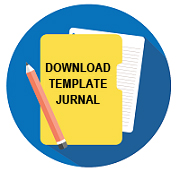Kemampuan Berpikir Komputasi dan Motivasi Belajar Matematika Siswa SMA Berdasarkan IQ
DOI:
https://doi.org/10.55340/japm.v10i2.1684Kata Kunci:
kemampuan CT, motivasi belajar, IQ, matematikaAbstrak
Berdasarkan penelitian sebelumnya, kemampuan berpikir komputasi dan motivasi belajar dapat dipengaruhi oleh perbedaan IQ. Selain itu motivasi belajar juga mempunyai korelasi dan pengaruh terhadap CT Skills. Namun penelitian mengenai kemampuan CT, motivasi belajar, dan IQ untuk mata pelajaran matematika serta hubungan antara kemampuan CT untuk matematika dan motivasi belajar masih terbatas. Jadi, penelitian ini dilakukan untuk mengisi kesenjangan tersebut. Metode penelitian ini menggunakan deskriptif kuantitatif dengan desain komparatif dan korelasi. Partisipan dalam penelitian ini adalah siswa salah satu SMA di kota Medan, dengan subjek sebanyak 41 siswa. Data penelitian diperoleh dengan menggunakan tes pemecahan masalah matematis untuk mengukur Kemampuan CT, dan angket untuk mengukur motivasi belajar siswa. Data dianalisis menggunakan regresi linier sederhana dan multivariat. Hasil penelitian diperoleh beberapa temuan antara lain kemampuan CT siswa pada kelompok IQ 100 lebih baik dibandingkan siswa pada kelompok IQ < 100 dalam menyelesaikan masalah matematika. Tidak ada perbedaan signifikan motivasi belajar antara siswa pada kelompok IQ 100 dan IQ < 100. Terdapat hubungan dan pengaruh yang signifikan motivasi belajar terhadap kemampuan CT.
Unduhan
Referensi
Ajisuksmo, C. R., & Saputri, G. R. (2017). The Influence of Attitudes Towards Mathematics, and Metacognitive Awareness on Mathematics Achievements. Creative Education, 08(03), 486–497. https://doi.org/10.4236/ce.2017.83037
Aminah, N., Sukestiyarno, Y. L., Cahyono, A. N., & Maat, S. M. (2023). Student Activities in Solving Mathematics Problems With a Computational Thinking Using Scratch. International Journal of Evaluation and Research in Education (Ijere), 12(2), 613. https://doi.org/10.11591/ijere.v12i2.23308
Attard, C., & Holmes, K. (2020). An Exploration of Teacher and Student Perceptions of Blended Learning in Four Secondary Mathematics Classrooms. Mathematics Education Research Journal, 34(4), 719–740. https://doi.org/10.1007/s13394-020-00359-2
Birgili, B. (2015). Creative and critical thinking skills in problem-based learning environments. Journal of Gifted Education and Creativity, 2(2), 71–80.
Blömeke, S., Jenßen, L., Grassmann, M., Dunekacke, S., & Wedekind, H. (2017). Process Mediates Structure: The Relation Between Preschool Teacher Education and Preschool Teachers’ Knowledge. Journal of Educational Psychology, 109(3), 338–354. https://doi.org/10.1037/edu0000147
Denning, P. J., & Tedre, M. (2019). Computational Thinking. https://doi.org/10.7551/mitpress/11740.001.0001
Deursen, A. J. A. M. van, & Dijk, J. A. v. (2021). IQ and Digital Inequality: An Empirical Investigation. New Media & Society, 25(6), 1248–1270. https://doi.org/10.1177/14614448211024012
Elshareif, E. E., & Mohamed, E. A. (2021). The Effects of E-Learning on Students’ Motivation to Learn in Higher Education. Online Learning, 25(3). https://doi.org/10.24059/olj.v25i3.2336
Gargroetzi, E., Hendry, I., Jeffreys, A., Patel, A., Wei, G. S., & Collaborative, C. M. T. (2021). Chapter 6: “I Have Gotten Braver”: Growing and Sustaining Critical Mathematics Pedagogies Through a Teacher Community of Praxis. Teachers College Record, 123(13), 1–30. https://doi.org/10.1177/016146812112301307
Harimurti, R., Qoiriah, A., Ekohariadi, E., & Munoto, M. (2018). Implementation of Computational Thinking Concepts in ICT Learning Using Scratch Programming. https://doi.org/10.2991/aptekindo-18.2018.23
Hasanudin, H., Akib, M., Said, E., Wael, A., & Hartanti, R. (2023). Students’ Motivation in Reading Test Responses Washback Effect on Learning in Higher Education. Kne Social Sciences. https://doi.org/10.18502/kss.v8i4.12882
Hava, K., & Koyunlu Ünlü, Z. (2021). Investigation of the relationship between middle school students’ computational thinking skills and their STEM career interest and attitudes toward inquiry. Journal of Science Education and Technology, 30(4), 484–495.
Hongquan, B., Wang, X., & Zhao, L. (2021). Effects of the Problem-Oriented Learning Model on Middle School Students’ Computational Thinking Skills in a Python Course. Frontiers in Psychology, 12. https://doi.org/10.3389/fpsyg.2021.771221
Jawawi, D. N. A., Jamal, N. N., Halim, S. A., Saadon, N. A., Mamat, R., Isa, M. A., Mohamad, R., & Hamed, H. N. A. (2022). Nurturing Secondary School Student Computational Thinking Through Educational Robotics. International Journal of Emerging Technologies in Learning (Ijet), 17(03), 117–128. https://doi.org/10.3991/ijet.v17i03.27311
Leonard, J., Brooks, W., Barnes-Johnson, J., & Berry, R. Q. (2010). The Nuances and Complexities of Teaching Mathematics for Cultural Relevance and Social Justice. Journal of Teacher Education, 61(3), 261–270. https://doi.org/10.1177/0022487109359927
Lim, B. L., & Chen, C. J. (2021). Computational Thinking (Algorithms) Through Unplugged Programming Activities: Exploring Upper Primary Students’ Learning Experiences. International Journal of Academic Research in Business and Social Sciences, 11(14). https://doi.org/10.6007/ijarbss/v11-i14/8946
Oluk, A., & Korkmaz, Ö. (2016). Comparing Students’ Scratch Skills With Their Computational Thinking Skills in Terms of Different Variables. International Journal of Modern Education and Computer Science, 8(11), 1–7. https://doi.org/10.5815/ijmecs.2016.11.01
Pahanael, Y. A. (2024). The Influence of Learning Interest and Motivation on Mathematics Learning Achievement in Class Vii Students of SMP Negeri 80 Jakarta. Edumatsains Jurnal Pendidikan Matematika Dan Sains, 8(2), 311–323. https://doi.org/10.33541/edumatsains.v8i2.5592
Peel, A., Sadler, T. D., & Friedrichsen, P. (2021). Using Unplugged Computational Thinking to Scaffold Natural Selection Learning. The American Biology Teacher, 83(2), 112–117. https://doi.org/10.1525/abt.2021.83.2.112
Peng, H.-H., Murti, A. T., Silitonga, L. M., & Wu, T.-T. (2023). Effects of the Fundamental Concepts of Computational Thinking on Students’ Anxiety and Motivation Toward K-12 English Writing. Sustainability, 15(7), 5855. https://doi.org/10.3390/su15075855
Perdana, R., Apriani, A.-N., Richardo, R., Rochaendi, E., & Kusuma, C. (2021). Elementary students’ attitudes towards STEM and 21st-century skills. International Journal of Evaluation and Research in Education (IJERE), 10(3), 1080–1088.
Sun, L., Hu, L., Yang, W., Zhou, D., & Wang, X. (2020). STEM Learning Attitude Predicts Computational Thinking Skills Among Primary School Students. Journal of Computer Assisted Learning, 37(2), 346–358. https://doi.org/10.1111/jcal.12493
Verschaffel, L., Depaepe, F., & Mevarech, Z. R. (2019). Learning Mathematics in Metacognitively Oriented ICT-Based Learning Environments: A Systematic Review of the Literature. Education Research International, 2019, 1–19. https://doi.org/10.1155/2019/3402035
Washbrooke, S. (2023). Teaching and Learning With Innovative Technologies and Practices at Primary School Level. Pacific Journal of Technology Enhanced Learning, 5(1), 3–4. https://doi.org/10.24135/pjtel.v5i1.165



























